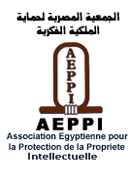|
|
|
|
|
Events |
|
|
INTERNATIONAL SYMPOSIUM
IN EGYPT (13 - 16 APRIL 2003)
|
 |
|
Report onWIPO/AEPPI INTERNATIONAL SYMPOSIUM
ON INTELLECTUAL PROPERTY PROTECTION
IN THE 21ST CENTURY: CHALLENGES AND OPPORTUNITIES
FORDEVELOPING COUNTRIES
(CAIRO, April 14-15, 2003)
|
In spite of the tragic events in the region, the
Symposium was a success since it attracted
approximately 120 participants, mostly local patent
attorneys,lawyers and representatives of
pharmaceutical industries but also practitioners
from Eastern Europe and the Arab Countries.The
opening ceremony started with short welcome
addresses from Mrs.Hoda Serageldine, President of
the Egyptian Group and Mr. Sherif Saadallah,Director,
Cooperation for Development Bureau for Arab
Countries (WIPO), who underlined the issues to be
discussed during the symposium. H.E. Dr. Mufid
Shehab, Minister of Higher Education and Scientific
Research gave a veryenlightening presentation on the
historical development of Egyptian Law on matters of
intellectual property which was well received by the
audience and reproduced in three leading daily
newspapers the second day.In the first working
session, Mr. Antony Taubman, Acting Director and
Head, Traditional Knowledge Division (WIPO), gave a
summary of the WIPO Patent Agenda.
Dr. Hossam Loutfy of Shalakani Law Firm, Egypt,
highlighted the public health issues under the Doha
Declaration and Mrs. Esmee Du Plessis of Adams &
Adams (South Africa) focused on compulsory licensing
and public health in the developing countries.In the
afternoon session, the first speaker, Mr. Taubman
indicated that traditional knowledge is inherent to
culture. It is very local in character and bound to
a community. While genetic resources are defined
under several international instruments there is no
universally recognized definition for
traditional knowledge.
|
The second speaker, Dr. Eid Abdel-Meguid, Director,
Agricultural Genetic Engineering Research Institute,
Egypt, addressed the issues of Biodiversity and
Biotechnology. He indicated that states have
sovereign rights over their own biological resources
and should enjoy a fair and equitable sharing of the
benefitsarising from the utilization of these
resources. He concluded that intellectual property
protection in Biotechnology is needed because
innovation is expensive to develop and cheap to
produce.
On the second day, Mr. Hopperger, Head, Information
and Training Section, Trademarks, Industrial Designs
and Geographical Indications Department, WIPO,
addressed the issue of protection of Geographical
Indications referring to the Paris Convention, TRIPs
and The Lisbon Agreement for appellations of
origins. He presented WIPO Guidelines for the
protection of Well–Known Trademarks. He also made a
comparison between the Madrid Agreement and the
Madrid Protocol for the International Registration
of Trademarks,
prompting the countries to join the Protocol.
|
|
|
|
|
|
In spite
In the following session, Mr. Paul Harris of
Hammonds, U.K., explained the application of
Exhaustion of IPR's in the U.K., Europe and the
U.S.A. He referred to Articles (2 & 3, 28 & 30) of
the Treaty of Rome and quoted also art.7 Directive
89 / 104 / EEC in this respect. Mr. Samir Hamza of
Baker & McKenzie Law Firm Egypt, explained that
exhaustion of IPR's under the new Egyptian Law No.
82 / 2002 will impact on parallel imports and
pricing of goods because it is applicable to
patents, designs, trademarks and copyrights. AEPPI
strongly opposed extending such exhaustion to
copyrights.
The afternoon session was dedicated to enforcement
issues. Mr. Taubman addressed multilateral
enforcement mechanisms. Whereby, Ms. Ola
Zahran,Counselor, Cooperation for Development Bureau
for Arab Countries, WIPO,focused on alternative
dispute resolution procedures and Dr. Hossam Loutfi
completed the picture with the Domain Name Dispute
Resolution according to WIPO procedures.
The closing session was highlightened by the
presentation of Dr. Fawzi El Rifai, President of the
Academy of Scientific Research (in charge of the
Patent Office). He described briefly the processing
of patent applications at the Egyptian Patent Office
from paper work stream-line to electronic filing
system with an on-line demonstration. Dr. El Rifai
also announced that Egypt
has signed the PCT Agreement.
In their closing addresses, Mrs. Hoda A. Serageldine
spoke of the role of non-governmental organizations,
media and |
|
|
|
|
|
educational institutions in increasing awareness of
the importance of IPR's and Mr. Sherif Saadallah
focused on the role of WIPO in promoting IPR's in
the developing countries. He stressed the fact that
developing countries should not concentrate only on
the subject of obligations imposed by IPR's, they
should aim to develop new technologies and reap
benefits from the IP system.
In this respect, AEPPI would like to thank WIPO for
their generous support as well as all the
distinguished speakers, chairpersons, reporters who
accepted to participate in this event. A special
acknowledgment should go to the Members of the
Organizing Committee who dedicated a lot of their
professional time to prepare an attractive social
program for the participants which culminated with a
full day visit to the spectacular Library of
Alexandria
|
|
more > |
|
|
|
|
|
|
The Egyptian Association for
the Protection of Intellectual Property (AEPPI)
Report on
WIPO/AEPPI INTERNATIONAL SYMPOSIUM ON INTELLECTUAL
PROPERTY: A STRATEGIC TOOL FOR ECONOMIC GROWTH
Organized byThe World Intellectual Property Organization (WIPO)
in cooperation with
The Government of the Arab Republic of Egypt
and
The Egyptian Association for the Protection of
Intellectual Property (AEPPI)Cairo, April 4 & 5, 2005
|
|
This Symposium was held on April
4 -5, 2005, in the Cairo Grand Hyatt Hotel and was
attended by 128 participants, including government
officials, local and foreign IP agents, attorneys
and representatives from the pharmaceutical and
other industries. Several participants came from
Europe and Arab countries.
Mrs. Hoda A. Serageldine, President of the Egyptian
Association for the Protection of Intellectual
Property (AEPPI), delivered a welcome address at the
opening ceremony in the presence of Mr. Luis Alfonso
Duran, Reporter General of the International
Association for the Protection of Intellectual
Property (AIPPI), and Mr. Sherif Saadallah,
Executive Director, Intellectual Property and
Economic Development Department, WIPO,Geneva.
In his speech, Mr. Duran spoke on the role of AIPPI
and the national groups, including the Egyptian
Group, in educating the public as to the importance
of the protection of IP right in all its kinds and
forms and IP’s role in economic development, the
spread of innovation and development of education.
Mr. Duran later pointed out that the problem was not
the protection of IPR but the underlying economic
problems. He went on to say that not providing
protection to owners of the IP will not resolve the
economic problems, which must be addressed on its
own.
Mr. Sherif Saadallah focused on that the best use of
the IP system does not only rest with the
availability of inductive legal environment but
requires in the first place the existence of general
policies aiming at the encouragement of both public
and private sectors to invest in research and
development, promote innovation and inventions at
the national level, taking care of human resources,
preventing the brain drain, improve production to be
able to compete in the local, regional and
international markets and the encouragement of local
industries to implement and develop swiftly new
technologies.
|
|
more > |
|
|
|
|
|
|
 |











